There has never been an opening ceremony quite like it.
For the first time in Olympic Games history, the ceremony took place outside a stadium arena. Despite a rainy and miserable Paris evening, enormous crowds – most who paid no fee to attend – lined the banks of the Seine to witness this outdoor promenade of history, art and sport as 100 boats carrying 10,500 athletes sailed down the river.
Designed to showcase the depth of French culture and celebrate the Olympics as a source of human greatness and unity, the ceremony combined the traditional and the irreverent.
Paris featured as the unmistakable backdrop. The ceremony marked the first since 2018 that has not had to work around COVID restrictions. As the world watched, it took place amid a global context of war, invasion and genocide. Within the performances and speeches featured in the ceremony, there were aspects designed to address and acknowledge this, and promote peace and inclusion.
A mission across Paris
The ceremony was divided into thematic chapters, including Fraternite (fraternity), Sororite (sorority), Sportive (sportsmanship), Solidarite (solidarity), Solennite (solemnity) and Eternite (eternity). These were used as prompts to underpin each section of the sprawling, epic ceremony.
Richard Heathcote/Pool Photo via AP
Across the three hours, we travelled throughout Paris. Artists and sportspeople from across the broad spectrum of each of these fields were featured and celebrated.
All was underpinned by an amazing soundtrack featuring French electro-pop bangers, classical music and opera.
The ceremony was anchored by a masked torch bearer who initially arrived at the Olympic stadium only to realise they were in the wrong place. They embarked on a Parkour-like mission across the rooftops and streets of Paris with the torch held aloft.
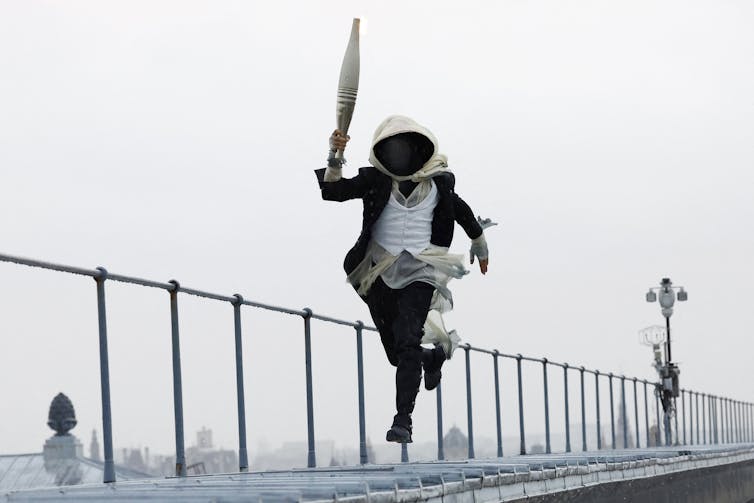
Peter Cziborra/Pool Photo via AP
Kicked off by a short film featuring French soccer star Zinedine Zidane, followed by a performance from Lady Gaga, the ceremony brought together the iconic and the unexpected.
Images of beret-wearing accordion players under bridges and the high kicks of 80 dancers in hot pink performing the can-can were interspersed with tributes to the French revolution and the contemporary rebuild of Notre Dame.
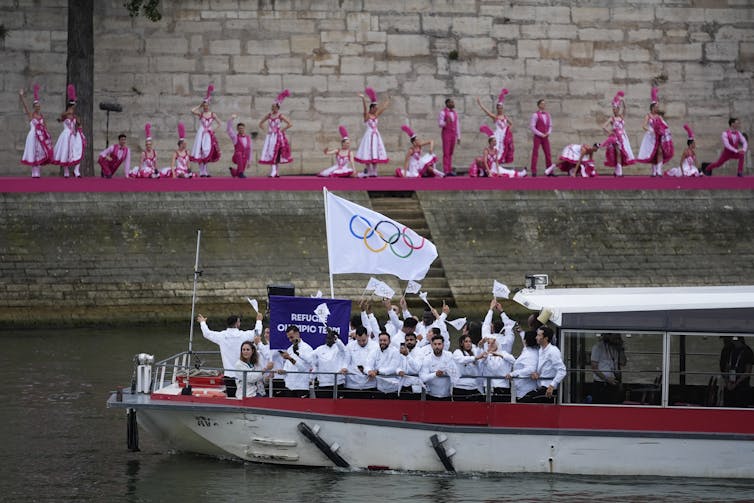
AP Photo/Lindsey Wasson
There were stylishly considered moments. A single opera performer sung the French national anthem on the roof of the Grand Palais, as tribute was paid to the history of women in France. During this moment, ten golden statues featuring prominent French female political advocates, anarchists, explorers, botanists, intellectuals, journalists, artists and writers from across history emerged from plinths situated in the river.
The moment ended with a soaring rendition of the anthem as the singer on the roof was accompanied by a chorus of children on a bridge across the river.
The ceremony brought together tradition and contemporary performance. In a stunning moment, French-Mali singer Aya Nakamura performed with 60 musicians of the Republican Choir Guard dressed by Dior (obviously).
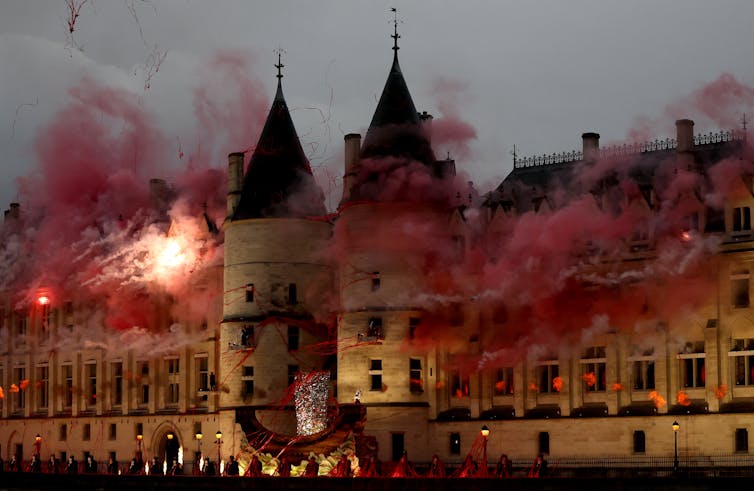
EPA/MOHAMMED BADRA
Profoundly stunning images such as a concert pianist playing on a bridge over the River Seine on a raindrop covered piano were juxtaposed with an animated film featuring the beloved Minions (created by a French animation studio).
BMX riders, breakers and circus performers on large pontoons performed death-defying stunts in front of illuminated fountains. A fashion parade on a bridge across the river featured up and coming French designers and included a demonstration of Eurodance styles including krumping, vogueing and breaking. DJs on decks and drag performers turned the Seine into Paris’ largest outdoor nightclub.
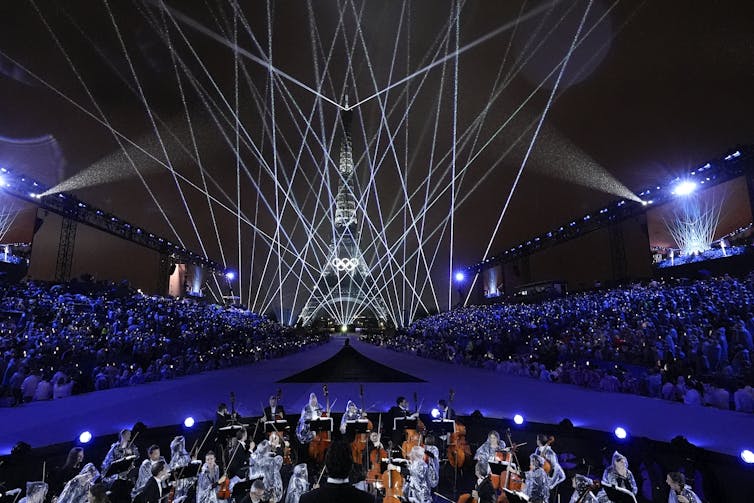
AP Photo/David J. Phillip
Peace, inclusion and solidarity
Toward the end of the three hour extravaganza, Paris was plunged into darkness as a singer standing near a burning grand piano floating on a barge delivered a poignant version of John Lennon’s Imagine.
The words “We Stand and Call for Peace” in both English and French appeared on screen. This elicited an enormous cheer from the crowd, and underscored a theme appearing in speeches and theatrical images throughout the ceremony: inclusion, respect, solidarity and the role the Olympics can play in supporting these notions across global borders.
“In our Olympic World we all belong,” claimed the International Olympic Committee chair Thomas Bach in his speech.
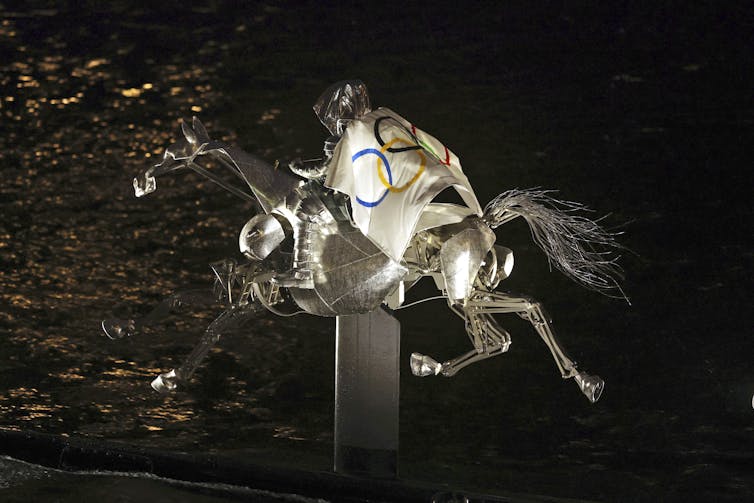
Clive Brunskill/Pool Photo via AP
Taking this idea further, as part of Solidarite, an illuminated silver mechanical horse carrying a rider wearing the Olympic flag appeared to gallop down the river. We watched images of Olympic moments over the years that united the world – and at times challenged dominant thinking.
The rider emerged from the river on a dappled grey horse at the Trocadero at the base of the iconic and resplendent Eiffel Tower. A parade of flag bearers from all countries assembled behind the rider as they walked together through the streets of Paris to raise the Olympic flag and sing the Olympic anthem.
It was magnificent and humbling.
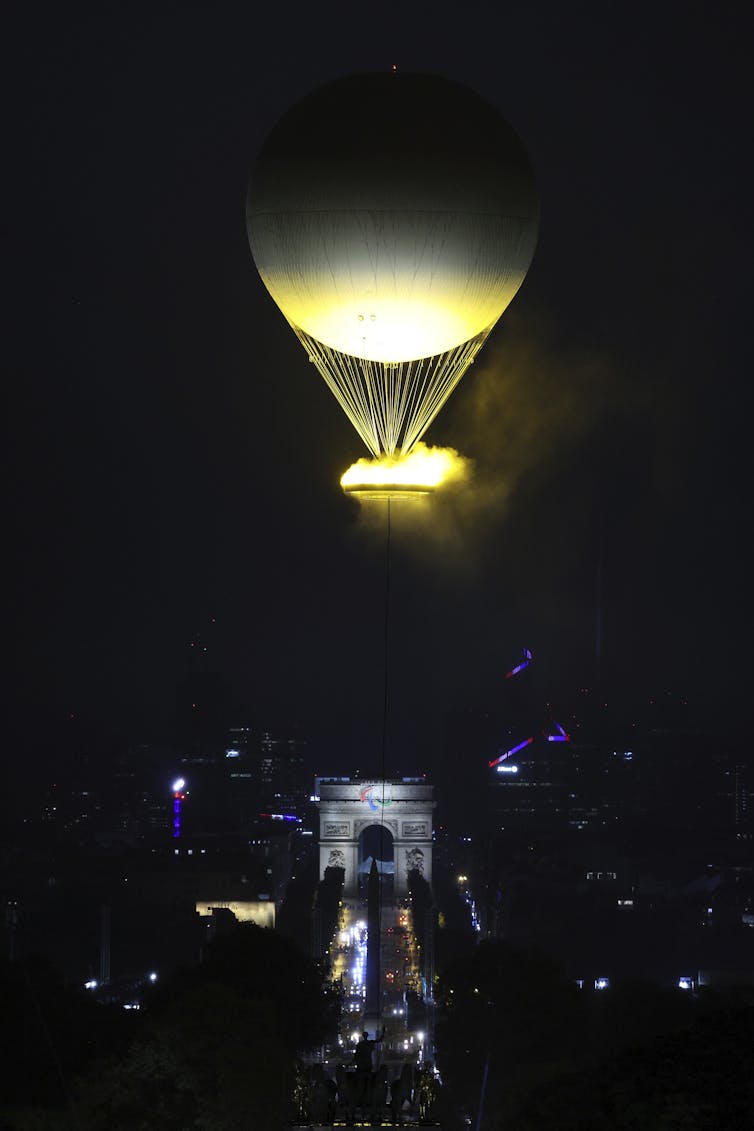
Richard Heathcote/Pool Photo via AP
Zidane returned in person near the end of the ceremony to meet the masked torch bearer and was handed the Olympic torch. As the Eiffel Tower lit up with a jaw-droppingly spectacular laser display illuminating across the city, the torch travelled back down the river on a boat with athletes Rafael Nadal, Serena Williams and Carl Lewis. It continued its journey toward its final destination with a sign-interpreted electronic dance banger in the background.
A parade of extraordinary French athletes completed the torch’s journey to the Olympic cauldron – a hot air balloon, a tribute to daring French inventors.
The cauldron was set aflame and the balloon lifted into the air above Paris to the cheers of the crowds.
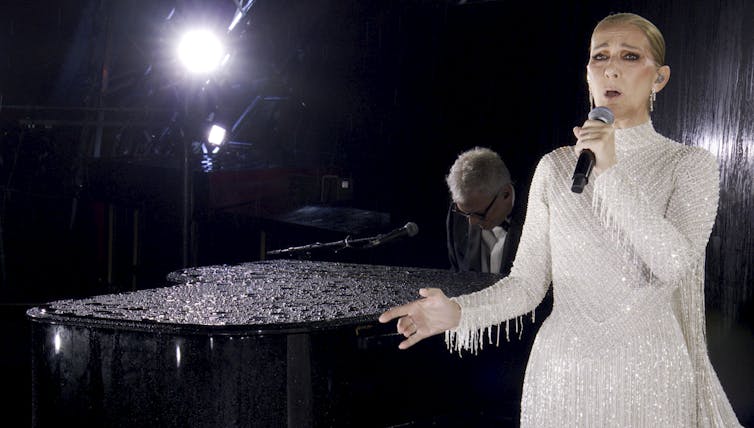
Olympic Broadcasting Services via AP
Underneath the illuminated Olympic rings on the Eiffel Tour, Celine Dion sung Edith Piaf’s Hymne A l’amour. Dion’s journey to this performance has been publicly marked by illness.
Her stirring and flawless performance against the odds speaks to the Olympic spirit of perseverance and witnessing superhuman feats of the extraordinary, reminding us sport and performance have much in common.
Let’s hope the rest of the sporting event can match this creative beginning.




